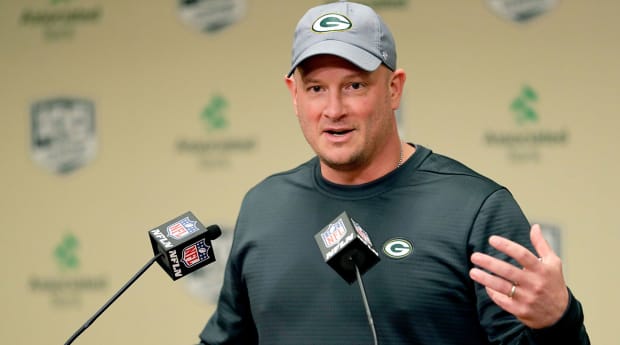It's a fun idea that an MVP would follow his old coach across the country, but it’s far from the only reason for Broncos fans to be excited.
Nathaniel Hackett will become the next head coach of the Broncos at some point this week, and become the next person to hold that office in the NFL who has to answer daily questions about Aaron Rodgers’s offseason plans.
The Broncos interviewed both Hackett, most recently the Packers’ offensive coordinator, and Packers quarterbacks coach Luke Getsy for the job, indicating, to some, a desire to become a Green Bay satellite camp attractive enough to draw the future Hall of Fame quarterback. It’s an understandable association, but the beauty of what Denver did with this hire is that, regardless of what happens, it doesn’t really matter. Having the best quarterback in the NFL on your team, of course, is beneficial. But the parts of Hackett’s pre-Rodgers history that rarely get discussed are the real reasons for hope in Denver after the franchise’s lengthy struggle with finding a head coach after the retirement of Gary Kubiak.

Sarah Kloepping/USA TODAY Network
Hackett is among a new school of coaches who can tailor a more fungible approach depending on the strength of his team’s personnel. That has been his ethos since he arrived in coaching as a fresh graduate with a neuroscience degree. We’re seeing that kind of success on the Eagles, Chargers and Bills. He designed an AFC championship-game-caliber offense for Blake Bortles in Jacksonville that, according to one member of the team, was torpedoed when a directive from above Hackett demanded the Jaguars start throwing the ball more. After he was let go as the team’s coordinator during the 2019 season, the person told me: “firing Nathanial Hackett was the biggest mistake [the Jaguars] made.”
Fast forward to this year, and Jacksonville brought him in to interview for the job after Urban Meyer was let go.
When he was the offensive coordinator at Syracuse, he so despised the scheme in progress that he ripped the whole thing apart after a particularly dismal full-squad scrimmage two weeks before the season. He installed the K-Gun à la the Bills’ Jim Kelly era, set a bunch of school records and produced the first legitimate Syracuse draft prospect at the quarterback position since Donovan McNabb.
Much of this tends to get buried underneath the rug for coordinators who eventually get the chance to work with a generational player at the position. Pete Carmichael has been the offensive coordinator of the Saints since 2009, mostly because people assume the engine for their success resided in the brains of Drew Brees and Sean Payton. But how do we know that for sure?
Eric Bieniemy has been the offensive coordinator of the Chiefs since 2018, at a time when Andy Reid’s coaching tree was being stripped faster than the Amazonian rainforest. Why? People assume it’s all Patrick Mahomes.
Hackett was able to carve out a unique niche for himself in Green Bay that, those who know and understand his role, understand went far beyond coat tail rider. He was the editor of the Packers’ narrative game plans, piecing together plays that could be called in sequence that set up larger chunk play opportunities down the road. He was the West Coast translator, speaking Rodgers’s native language and helping to carry those concepts into the Kyle Shanahan-ian, outside-zone scheme. He was also the Packers’ emotional force. David Bakhtiari told me a few months ago that Hackett was a “walking culture.” Rodgers, a notoriously complex player who has had difficult relationships with some of his previous coaches, said “no one brings me more joy.”
Regardless of who is under center for the Broncos, he’ll be part of a team that is built around relentless inclusivity and positivity. Hackett’s meetings in Green Bay, Buffalo and Syracuse were events according to people who have attended them. In Green Bay, a meeting might have meant his gold zone highlights, where he splices together the team’s best red zone plays aside clips of Goldmember from Austin Powers yelling “I looooove goooooooold.” In Syracuse, it was games of cornhole and blasting the musical comedy troupe Lonely Island. It was strategically making fun of everyone and everything as a memory and attention-grabbing tool for athletes who don’t derive a ton of pleasure from sitting in meetings all day.
Traditionally, that kind of passion and energy for the job has worked more consistently than bringing in a certain scheme. From an administrative standpoint, he’ll check a lot of boxes in terms of installing a good offense and defense, likely bringing with him to Denver a coordinator who can keep alive the principles of the successful Vic Fangio defense (Ejiro Evero worked under Brandon Staley for the Chargers) and an offensive coordinator who can harness the intricacies of the outside zone (Packers offensive line coach Adam Stenavich should be a favorite for that job). His only conviction, though, is that none of that is set in stone.
This is why the Rodgers question, while interesting, will ultimately be immaterial. If the best player in the NFL decides to pass on following his old coach through the door, who else would you rather have than a coach who has made it work with everyone else anyway?
• A Fitting Final Game for Tom Brady (Yeah, Right)
• Thirteen Seconds: Mahomes, Chiefs Win an Instant Classic
• Measuring the Super Bowl Stakes for Each Remaining Quarterback
• MMQB: McVay’s Faith in Stafford Rewarded on Year’s Best NFL Weekend